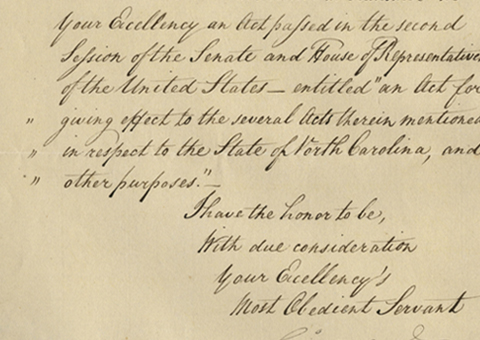Sold – The Former Leader of the Arab Rebellion Intercedes With the French in Algeria

He intervenes on behalf of two Muslims convicted by the French military leadership of Algeria.
Abd Al-Qa¯dir was born in Algeria and, in addition to being a linguistic and religious scholar, was a warrior for Arab independence from colonial rule after the fall of Ottoman Empire and during the French military rule over his country. After Algeria was invaded by France, al-Qa¯dir became an Emir and with...
Abd Al-Qa¯dir was born in Algeria and, in addition to being a linguistic and religious scholar, was a warrior for Arab independence from colonial rule after the fall of Ottoman Empire and during the French military rule over his country. After Algeria was invaded by France, al-Qa¯dir became an Emir and with the loyalty of a number of tribes began a rebellion. He was effective at using guerrilla warfare and for a decade, up until 1842, scored many victories. However, the French suppressed the native population and practiced a scorched-earth policy. On December 21, 1847, after being denied refuge in Morocco, he was forced to surrender. Al-Qa¯dir was exiled to France, where he was detained until 1852, then released by Napoleon III on taking an oath never again to disturb Algeria. He moved to Damascus. In July 1860, conflict between the Druze and Maronites of Mount Lebanon spread to Damascus, and local Muslims attacked the Christian quarter, killing over 3,000 persons. `Abd al-Qa¯dir saved large numbers of Christians and was given the Légion d’honneur by the French government. He would thereafter be an important line of communication between the French government and the Arab world.
Here he intervenes on behalf of two Muslims convicted by the French military leadership of Algeria.
Letter Signed, no place (presumably Damascus), 12th Jumadi al-thani 1290 (6 August 1873), to the Prefect of Oran, Charles de Bouzet. Written in Arabic, it was translated into French by the Colonial authorities. “Ali ben Allah has lived many years in Syria. It has reached him this last day that a man by the name of El Hadj Muhammed ben Cha’a of Oran had escaped from prison and that he had followed the custom of a traveler and passed the night at the house of his family. Also, the Administrator of Zair emprisoned Bon Azza, brother of the above and his wife, Bedra Mohammed. The former Emir begs the Hon. Prefect to favor him with an examination of the cases of these two people with care and to order their release at the earliest possible moment and to not disparage their names.”
The ex-Emir has signed in pen and affixed his stamp to the bottom of the letter. The document contains one small tear along the central fold and bottom right corner, and there is paper loss at top left.

Frame, Display, Preserve
Each frame is custom constructed, using only proper museum archival materials. This includes:The finest frames, tailored to match the document you have chosen. These can period style, antiqued, gilded, wood, etc. Fabric mats, including silk and satin, as well as museum mat board with hand painted bevels. Attachment of the document to the matting to ensure its protection. This "hinging" is done according to archival standards. Protective "glass," or Tru Vue Optium Acrylic glazing, which is shatter resistant, 99% UV protective, and anti-reflective. You benefit from our decades of experience in designing and creating beautiful, compelling, and protective framed historical documents.
Learn more about our Framing Services






































































































